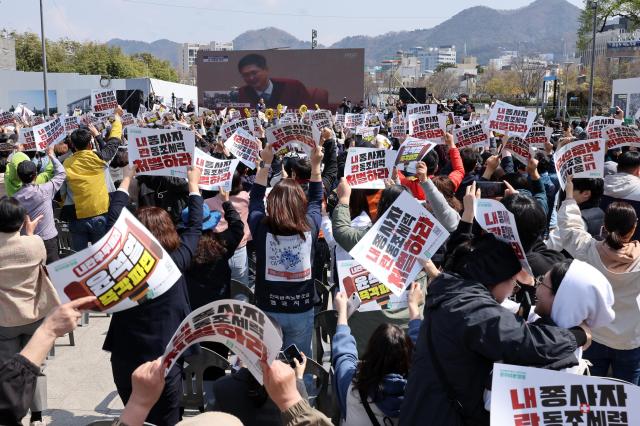
SEOUL, April 04 (AJP) - The Constitutional Court unanimously ruled on April 4 to remove President Yoon Suk Yeol from office.
Below is the full summary of the ruling read aloud by Acting Chief Justice Moon Hyung-bae in the Grand Chamber. The petitioner is the National Assembly. The respondent is former President Yoon.
---
We now begin the ruling on case 2024Hun-Na8 regarding the impeachment of President Yoon Suk Yeol.
-
First, on procedural legitimacy:
-
The declaration of martial law, even if a high-level political decision, is subject to judicial review when considering the impeachment trial's purpose of protecting the constitutional order from violations by senior officials.
-
The absence of a review by the National Assembly's Legislation and Judiciary Committee does not make the impeachment resolution invalid. The Constitution delegates impeachment procedures to legislative discretion, and the National Assembly Act makes such review optional.
-
The principle of double jeopardy was not violated. The first impeachment motion failed during the 418th session, and the current one was introduced in the 419th session. Justice Chung Hyeong-sik noted the need for a law limiting repeated filings across different sessions.
-
The lifting of martial law shortly after its declaration does not negate the legal standing of the case. The cause for impeachment had already materialized.
-
Changing the legal basis from criminal charges to constitutional violations is permissible if the factual background remains consistent. The respondent’s claim that the vote would have failed without the original charge is speculative and lacks evidence.
-
The impeachment power was not abused. The procedure was lawful, and evidence of constitutional violations existed.
-
On evidentiary rules: Justices Lee Mi-seon and Kim Hyeong-du supported a relaxed application of hearsay rules. Justices Kim Bok-hyeong and Cho Han-chang supported stricter application moving forward.
-
On the constitutional and legal violations by the respondent and their gravity:
-
Martial law requires a real emergency such as war or serious civil disorder. The respondent claimed that legislative overreach by the opposition-controlled Assembly justified the declaration, citing excessive impeachment motions and unilateral budget cuts. However, at the time, only two trials were underway, the budget had not passed, and vetoed bills had not taken effect. Allegations of election fraud were unsubstantiated. The NEC had implemented security measures and oversight. No objective emergency existed.
-
The martial law declaration did not follow required procedures. Although the president informed the prime minister and nine ministers, details were not shared, nor were opinions solicited. Required co-signatures were missing, no formal notice was given to the Assembly, and essential announcement requirements were not fulfilled.
-
The respondent ordered troops into the National Assembly. Soldiers entered via helicopters, some breaking windows. He directed special forces to drag lawmakers out and instructed the police chief to block access, resulting in lawmakers being unable to enter. The Defense Security Command was ordered to track political figures’ locations. This violated legislative powers and civil rights, and compromised military neutrality.
-
The martial law proclamations banned legislative, local, and party activities. These violated constitutional articles protecting the Assembly's power to cancel martial law, party pluralism, civil liberties, and required legal procedures.
-
The president ordered an unauthorized inspection of the National Election Commission’s systems. Military personnel entered without a warrant, confiscated phones, and conducted surveillance, violating judicial oversight and the NEC’s independence.
-
The respondent attempted to locate retired Supreme Court justices for potential detention, undermining judicial independence.
-
On whether the violations justify removal:
By using military force to disrupt the National Assembly and suppress freedoms, the president undermined democratic principles and constitutional order. His actions disregarded proper governance mechanisms and revived a history of emergency power abuse.
These violations severely damaged public trust and the rule of law. The rapid lifting of martial law was due to civilian resistance and military restraint, not because the offense was minor.
The president’s power comes from the Constitution and must remain within it. He instead caused national disruption, violated his duty to unite the people, and infringed on other institutions’ rights.
These acts represent a grave betrayal of public trust. The constitutional benefit of removal outweighs the cost.
We hereby rule, unanimously:
Yoon Suk Yeol is removed from office.
The ruling was delivered at 11:22 a.m.
Copyright ⓒ Aju Press All rights reserved.





View more comments